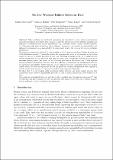| dc.contributor.author | Kuznetsov, Petr | |
| dc.contributor.author | Herlihy, Maurice | |
| dc.contributor.author | Newport, Calvin Charles | |
| dc.contributor.author | Lynch, Nancy Ann | |
| dc.contributor.author | Guerraoui, Rachid | |
| dc.date.accessioned | 2010-01-29T18:51:35Z | |
| dc.date.available | 2010-01-29T18:51:35Z | |
| dc.date.issued | 2009-01 | |
| dc.date.submitted | 2008-11 | |
| dc.identifier.issn | 1432-0452 | |
| dc.identifier.issn | 0178-2770 | |
| dc.identifier.uri | http://hdl.handle.net/1721.1/51039 | |
| dc.description.abstract | Many problems in distributed computing are impossible to solve when no information about process failures is available. It is common to ask what information about failures is necessary and sufficient to circumvent some specific impossibility, e.g., consensus, atomic commit, mutual exclusion, etc. This paper asks what information about failures is necessary to circumvent any impossibility and sufficient to circumvent some impossibility. In other words, what is the minimal yet non-trivial failure information. We present an abstraction, denoted $${\Upsilon}$$ , that provides very little information about failures. In every run of the distributed system, $${\Upsilon}$$ eventually informs the processes that some set of processes in the system cannot be the set of correct processes in that run. Although seemingly weak, for it might provide random information for an arbitrarily long period of time, and it eventually excludes only one set of processes (among many) that is not the set of correct processes in the current run, $${\Upsilon}$$ still captures non-trivial failure information. We show that $${\Upsilon}$$ is sufficient to circumvent the fundamental wait-free set-agreement impossibility. While doing so, (a) we disprove previous conjectures about the weakest failure detector to solve set-agreement and (b) we prove that solving set-agreement with registers is strictly weaker than solving n + 1-process consensus using n-process consensus. We show that $${\Upsilon}$$ is the weakest stable non-trivial failure detector: any stable failure detector that circumvents some wait-free impossibility provides at least as much information about failures as $${\Upsilon}$$ does. Our results are generalized, from the wait-free to the f-resilient case, through an abstraction $${\Upsilon^f}$$ that we introduce and prove minimal to solve any problem that cannot be solved in an f-resilient manner, and yet sufficient to solve f-resilient f-set-agreement. | en |
| dc.language.iso | en_US | |
| dc.publisher | Springer Berlin Heidelberg | en |
| dc.relation.isversionof | http://dx.doi.org/10.1007/s00446-009-0079-3 | en |
| dc.rights | Article is made available in accordance with the publisher's policy and may be subject to US copyright law. Please refer to the publisher's site for terms of use. | en |
| dc.source | Joanne Hanley | en |
| dc.title | On the weakest failure detector ever | en |
| dc.type | Article | en |
| dc.identifier.citation | Guerraoui, Rachid et al. “On the weakest failure detector ever.” Distributed Computing 21.5 (2009): 353-366. | en |
| dc.contributor.department | Massachusetts Institute of Technology. Computer Science and Artificial Intelligence Laboratory | en_US |
| dc.contributor.department | Massachusetts Institute of Technology. Department of Electrical Engineering and Computer Science | en_US |
| dc.contributor.approver | Lynch, Nancy Ann | |
| dc.contributor.mitauthor | Lynch, Nancy Ann | |
| dc.contributor.mitauthor | Guerraoui, Rachid | |
| dc.contributor.mitauthor | Newport, Calvin Charles | |
| dc.relation.journal | Distributed Computing | en |
| dc.eprint.version | Author's final manuscript | |
| dc.type.uri | http://purl.org/eprint/type/SubmittedJournalArticle | en |
| eprint.status | http://purl.org/eprint/status/PeerReviewed | en |
| dspace.orderedauthors | Guerraoui, Rachid; Herlihy, Maurice; Kuznetsov, Petr; Lynch, Nancy; Newport, Calvin | en |
| dc.identifier.orcid | https://orcid.org/0000-0003-3045-265X | |
| mit.license | PUBLISHER_POLICY | en |
| mit.metadata.status | Complete | |
